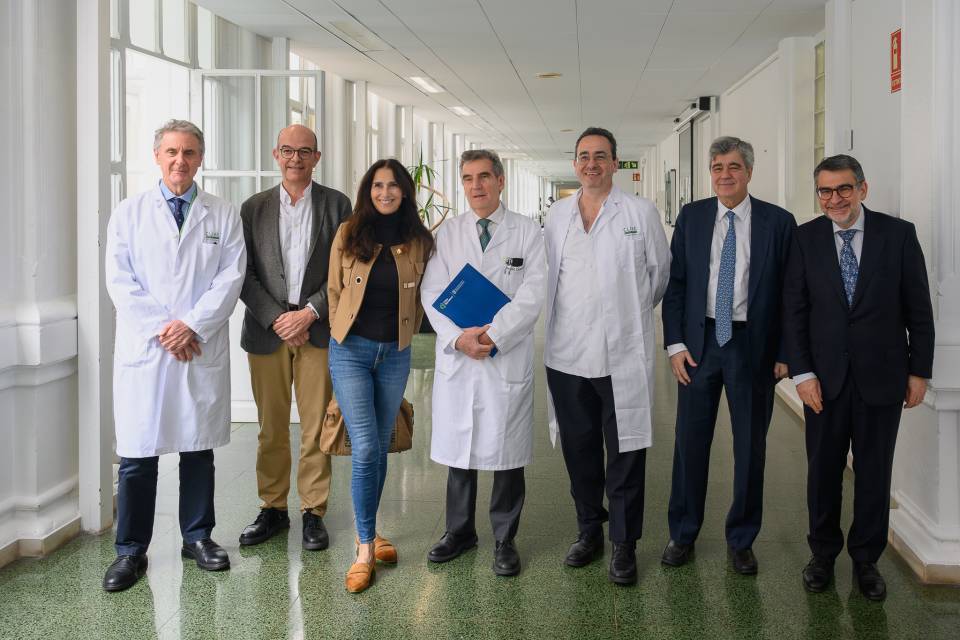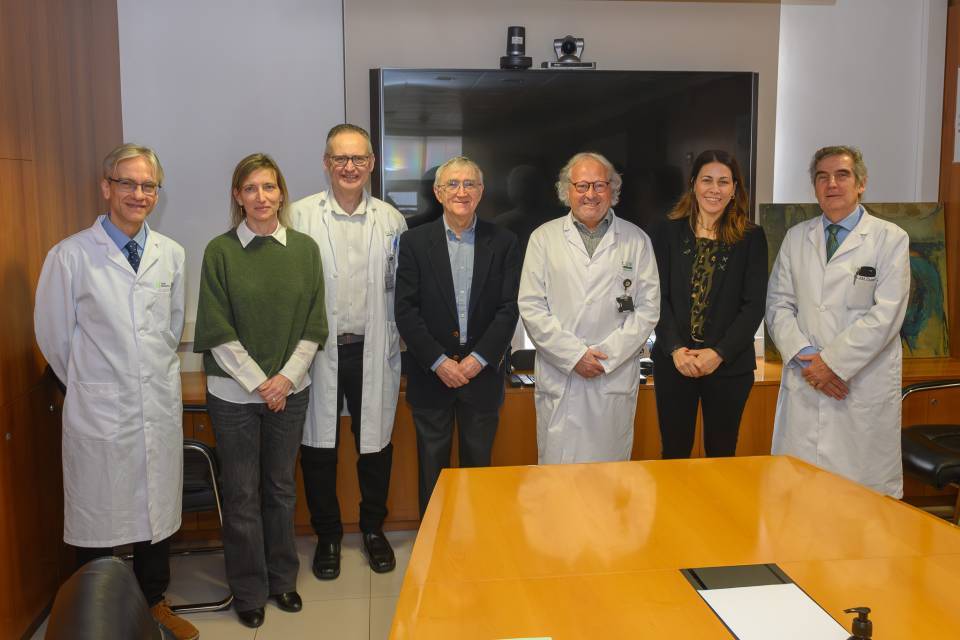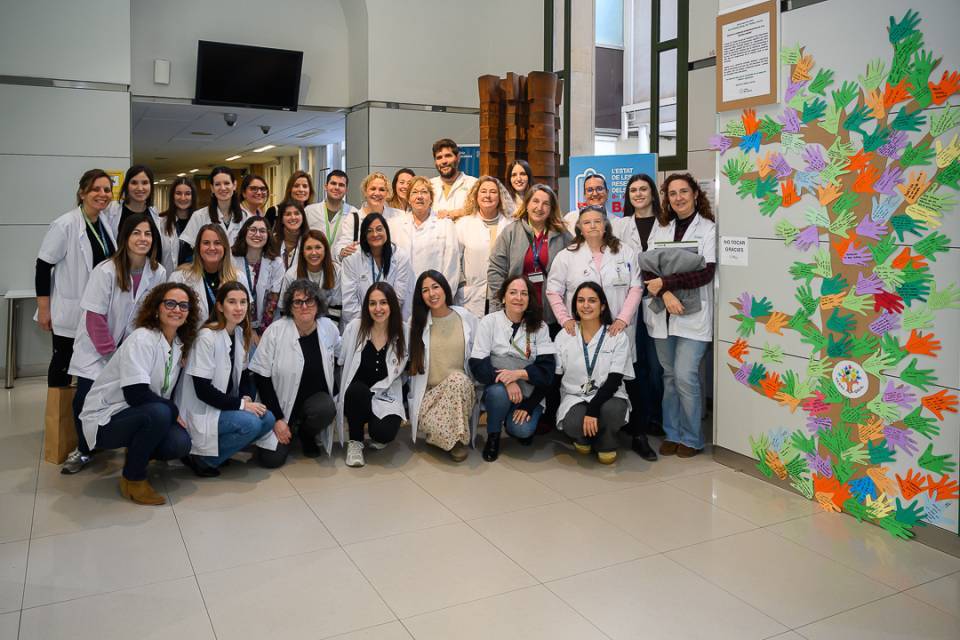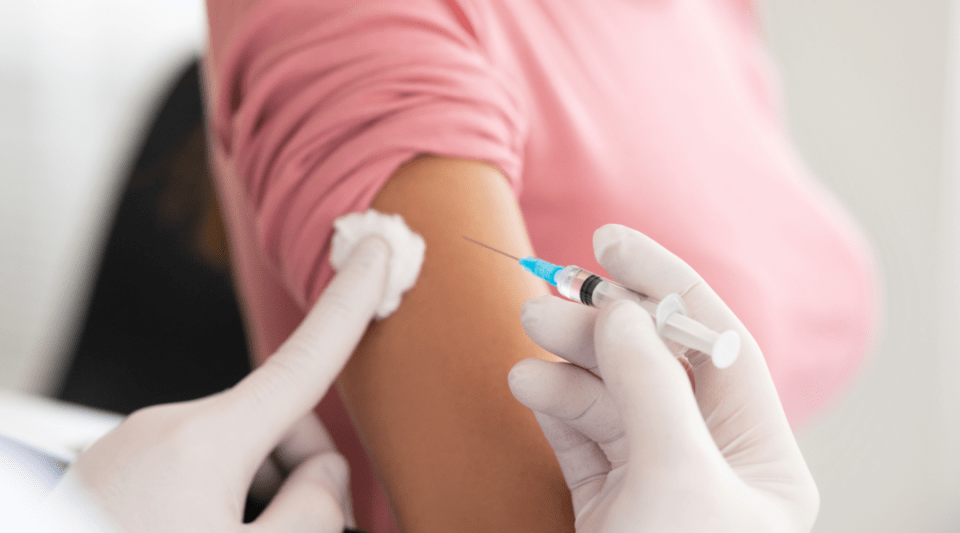The director general of the Hospital Clínic Barcelona-IDIBAPS, Josep Maria Campistol; the healthcare director of the Catalan Health Service, Ignasi Carrasco; and the deputy director general for Research and Grants at the ”la Caixa” Foundation, Àngel Font, explained today in a press conference that the Clínic-IDIBAPS has reached a historic milestone with the treatment of over 500 patients with its own CAR T-cell therapies, a type of advanced immunotherapy that uses the patient’s own cells to treat different types of cancer.
The press conference was also attended by Dr Álvaro Urbano-Ispizua, coordinator of the CAR-T Programme at the Clínic-IDIBAPS and head of the IDIBAPS Hematopoietic Progenitor Cell Transplantation group; Dr Manel Juan, head of the Immunology Service at the Clínic and the IDIBAPS Immunogenetics and Immunotherapy in Autoinflammatory and Immune Responses group; and Ms Silvia Rovira, a patient who received CAR T-cell therapy. The event was also attended by the director general of the ”la Caixa” Foundation, Josep Maria Coronas.
CAR T-cell therapy at the Clínic-IDIBAPS
Since May 2017, when the first infusion of a CAR T-cell treatment was carried out, the Clínic-IDIBAPS has led the development of various innovative immunotherapies. Two of these therapies have been approved by the Spanish Agency of Medicines and Medical Devices (AEMPS) as non-industrially manufactured advanced therapy medicinal products: ARI-0001, indicated for patients with acute lymphoblastic leukaemia, and ARI-0002h, for treating multiple myeloma. Both have demonstrated efficacy and safety in people who have not responded to other treatments.
The development and production of advanced therapies is possible thanks to the involvement of a multidisciplinary team made up of around 200 professionals from IDIBAPS, the Hospital Clínic and the University of Barcelona, and to their commitment to medical innovation, research and continuous improvement in cancer treatment.
The development of CAR T-cell therapies at the Clínic-IDIBAPS, received its initial momentum from the ARI Project and enjoys the fundamental support of the ”la Caixa” Foundation through an alliance worth €8.5 million promoted by the CaixaResearch Immunotherapy Research Unit, and the Carlos III Health Institute (ISCIII).
A State network for treating patients with ARI CAR T-cell therapies
The administration of the ARI CAR T-cell therapies was initially carried out through rigorous clinical trials that met the requirements of the Spanish Agency of Medicines and Medical Devices (AEMPS), developed by the Clinical Pharmacology, Immunology, and Haematology services of the Hospital Clínic Barcelona.
After proving the efficacy and the safety of the ARI therapies, they are now administered to patients routinely in the Haematology Service at the hospital’s Cancer and Blood Diseases Institute (ICAMS).
Since the programme started in 2017, an increasing number of patients are being treated each year, reaching over 100 annually. The diseases they have been used to treat are acute lymphoblastic leukaemia, multiple myeloma, and non-Hodgkin lymphoma. Of these over 500 patients, 70% came from other hospitals in Spain.
More than half of the patients treated with ARI CAR-T therapies achieve complete disease remission. The treatment response rate is 90% for acute lymphoblastic leukemia, 60% for multiple myeloma, and 50% for non-Hodgkin's lymphoma.
“The vast majority of the 502 treatments mentioned were for people with blood cancer resistant to conventional treatments. The ARI therapies were a lifeline and now many of these patients have been cured”, explains Dr Álvaro Urbano-Ispizua.
The Clínic is now leading a decentralized model for the administration of ARI CAR T-cell therapies throughout Spain, in collaboration with 13 Spanish hospitals. The aim is to bring these CAR T-cell therapies to the whole country.
Bringing treatment closer to the patient
The decentralized production of the CAR T-cell therapies allows the treatment to be brought closer to patients. In this way, the time between apheresis, the first step in the preparation, and the infusion of the CAR-T once produced, is reduced. At present, apart from the Clínic, there are two more ARI CAR T-cell therapy production centres: the Hospital Sant Joan de Déu in Barcelona and the Clínica Universidad de Navarra.
The production of each CAR T-cell treatment requires the combined efforts of over 30 professionals specialized in the production of advanced therapies and work in cleanrooms, including specialists in immunology, specialists in regulation applied to production, laboratory technicians and support staff. The process involves the genetic engineering of the patient’s cells in cleanrooms, under strictly controlled conditions. Overall, a single treatment involves 10 days of continuous work by two doctors and three technicians.
“Each of the CAR T-cell therapies produced represents not only a medical breakthrough but also the dedication, expertise, and commitment of all the professionals involved”, says Dr Manel Juan.
Dr Josep M. Campistol is delighted to have reached the milestone of 500 patients treated with ARI CAR-T-cell therapies: “This achievement makes the Clínic-IDIBAPS a benchmark in innovation and academic development for this type of therapy, since it is the only hospital in Europe to have developed and to offer two academic CAR T-cell therapies approved by a regulatory authority. Our aim is to make these treatments available to those who require them anywhere in the country”.
In the words of Àngel Font, deputy director general for Research and Grants at the ”la Caixa” Foundation: “These successes inspire us and remind us of the importance of continuing to carry out research and innovate, even breaking down barriers in those areas where it previously seemed impossible. Fifteen years ago, the first CAR immunotherapy was developed, and these first patients, like those treated at the Clínic, are a clear example of how it is possible to turn the immune system into a powerful and effective tool against cancer. In science, and especially in research, there must always be the conviction that limits can be overcome. One example of this vision is the CaixaResearch Institute, which six years ago was just an idea, an ambitious project that is now about to be inaugurated. The CaixaResearch Institute, focused entirely on the study of immunology, was also a pipe dream and is now a reality. Now, in 2025, we are clear that immunology is capable of curing diseases and of being a beacon of hope, in the case of cancer, for those who have exhausted all available commercial treatment options”.
The healthcare director of the Catalan Health Service, Ignasi Carrasco, explains that the milestone reached “is an example of how the Clínic-IDIBAPS carries out high-impact, high-value research and innovation that reaches the public”.
The future of CAR T-cell therapies at the Clínic-IDIBAPS
Cellular immunotherapy is one of the main lines of research and medical innovation carried out by the Clínic Barcelona Comprehensive Cancer Center in order to develop new CAR T-cell therapies to treat patients with different types of solid tumours or haematological malignancies.
Moreover, research is also focused on improving the functionality of the CAR T-cell therapies once they reach the tumour.
In addition to the two approved CAR T-cell therapies, the Clínic has launched a new pioneering clinical trial of a new CAR T-cell therapy for lymphoma, ARI-0003. “This is a dual-targeting CAR T-cell therapy and it recognizes two therapeutic targets on the malignant cells: CD-19 and BCMA”, explains Dr Álvaro Urbano-Ispizua.
A trial is also due to begin soon with the CAR-T HER2 to treat breast cancer, and with the CAR-T ARI-007 to treat patients diagnosed with T-cell acute lymphoblastic leukaemia.
In addition, the Clínic is continuing to develop new CAR T-cell therapies in the laboratory, incorporating improvements that increase their efficacy significantly.
“At the Clínic we reaffirm our commitment to bring our advanced therapies to as many patients as possible, with a model of strategic alliances with a global scope and a sustainable model for healthcare systems” says Noelia Mateo, global director of Advanced Therapies.
The Bosch i Aymerich Foundation, the Spanish Association Against Cancer (AECC), and companies and individuals have also collaborated in the development of CAR T-cell therapies at the Clínic-IDIBAPS through a large number of donations. Thanks to this support from public institutions and civil society, work is being carried out on the development of new lines of treatment with CAR T-cell therapies.




